MOD004061 - Healthcare Policy: Integrated Care Programs Analysis
VerifiedAdded on 2023/05/27
|16
|4404
|263
Report
AI Summary
This report provides a critical analysis of Integrated Care Programs (ICPs) at both national and local levels, specifically focusing on the Greenwich Borough of London. It evaluates organizational planning and healthcare management through the lens of public health planning, healthcare management planning, leadership theory, and change management models, including Kurt Lewin's model. The analysis incorporates Mayo's Human Relations theory to assess policy implementation, identifying driving and restraining forces. The report also addresses quality of care and concludes with recommendations for improvement, such as implementing transformational leadership, increasing privatization with insurance coverage, and enhancing healthcare professionals' skills in change management within ICPs. Evidence-based analysis is incorporated using resources such as the King's Fund and the Nuffield Trust. This assignment solution is available on Desklib, where students can find a wealth of study resources including past papers and solved assignments.

Running head: HEALTH CARE POLICY
Health Care Policy
Name of the Student
Name of the University
Author Note
Health Care Policy
Name of the Student
Name of the University
Author Note
Paraphrase This Document
Need a fresh take? Get an instant paraphrase of this document with our AI Paraphraser
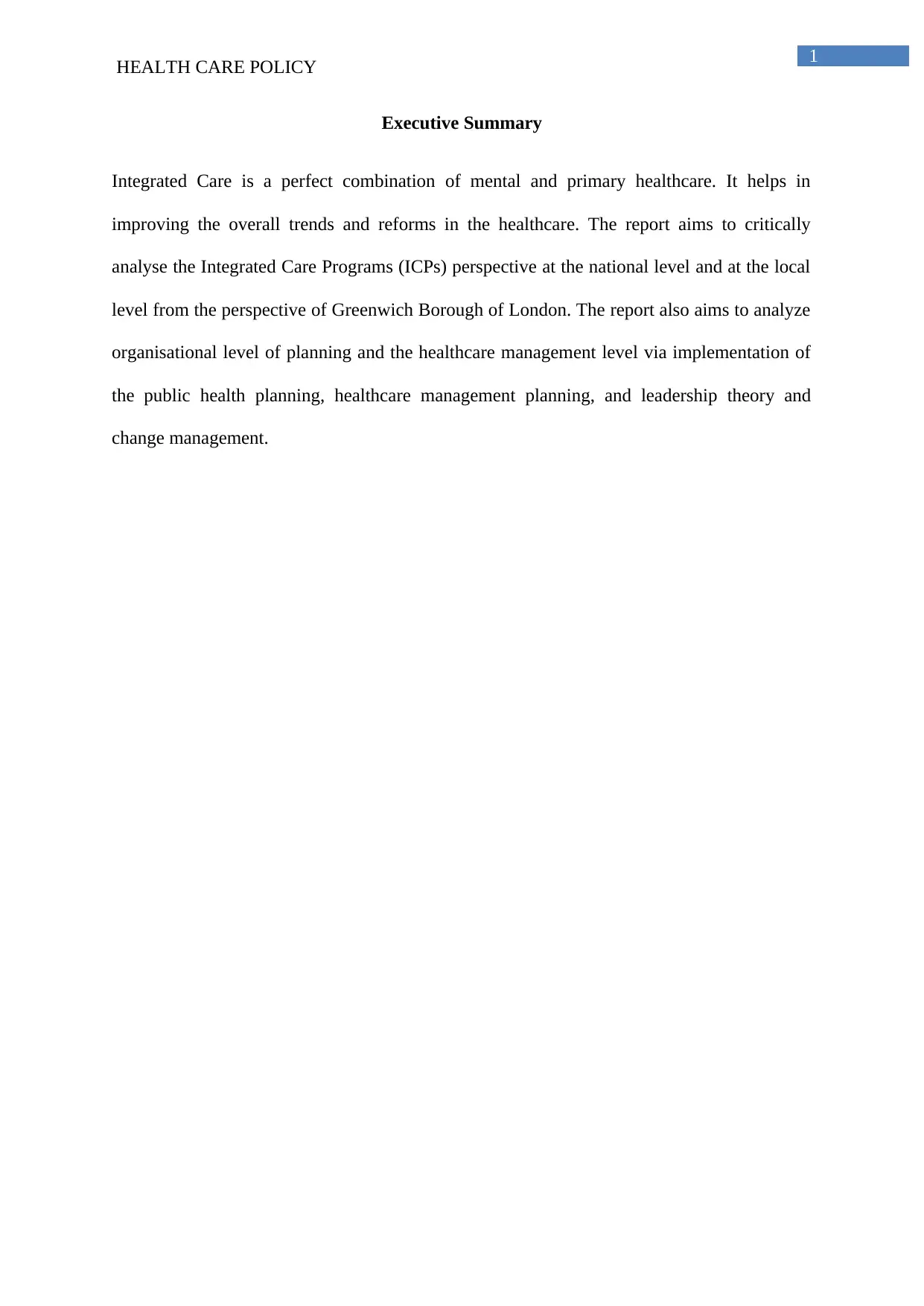
1
HEALTH CARE POLICY
Executive Summary
Integrated Care is a perfect combination of mental and primary healthcare. It helps in
improving the overall trends and reforms in the healthcare. The report aims to critically
analyse the Integrated Care Programs (ICPs) perspective at the national level and at the local
level from the perspective of Greenwich Borough of London. The report also aims to analyze
organisational level of planning and the healthcare management level via implementation of
the public health planning, healthcare management planning, and leadership theory and
change management.
HEALTH CARE POLICY
Executive Summary
Integrated Care is a perfect combination of mental and primary healthcare. It helps in
improving the overall trends and reforms in the healthcare. The report aims to critically
analyse the Integrated Care Programs (ICPs) perspective at the national level and at the local
level from the perspective of Greenwich Borough of London. The report also aims to analyze
organisational level of planning and the healthcare management level via implementation of
the public health planning, healthcare management planning, and leadership theory and
change management.
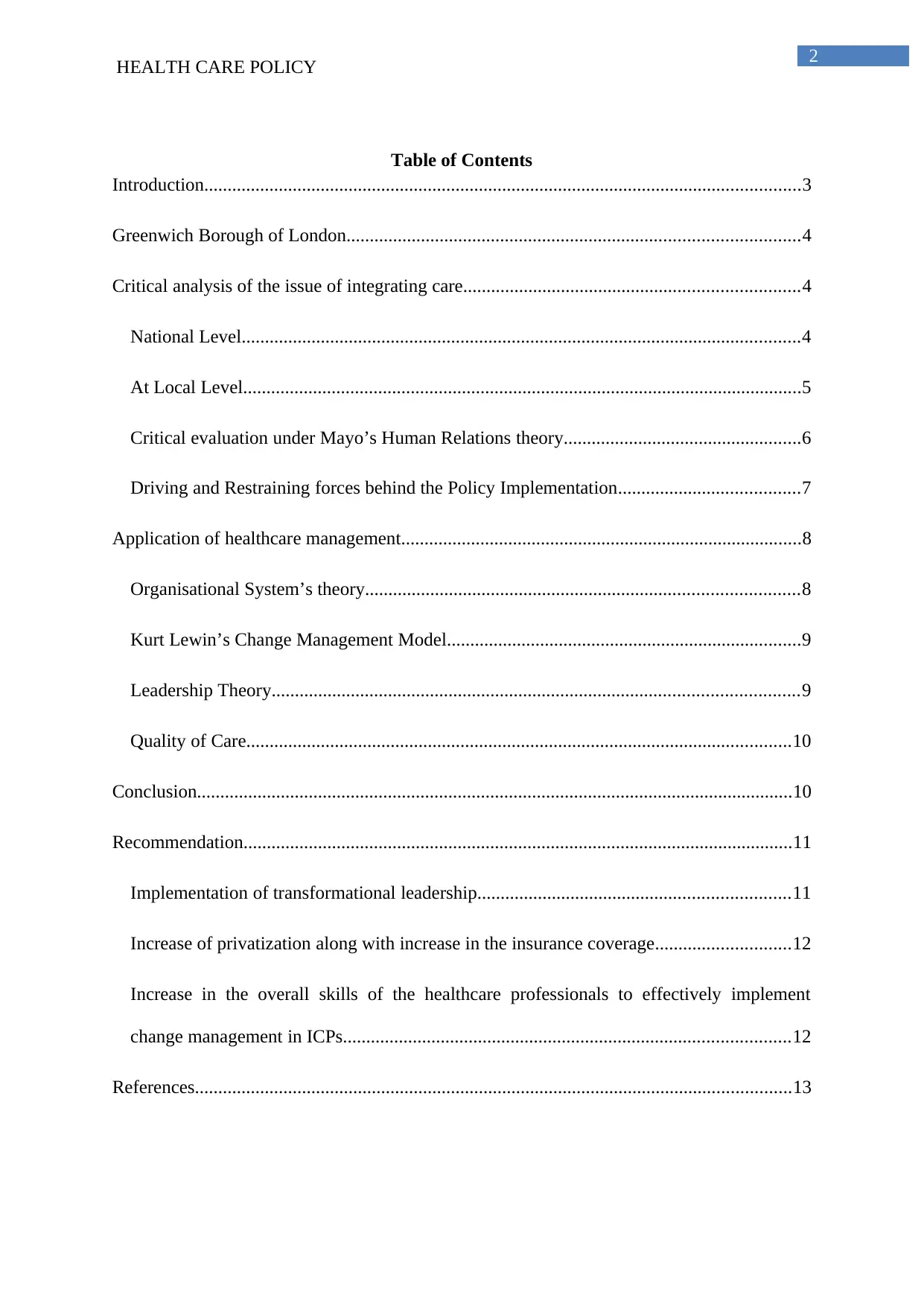
2
HEALTH CARE POLICY
Table of Contents
Introduction................................................................................................................................3
Greenwich Borough of London.................................................................................................4
Critical analysis of the issue of integrating care........................................................................4
National Level........................................................................................................................4
At Local Level........................................................................................................................5
Critical evaluation under Mayo’s Human Relations theory...................................................6
Driving and Restraining forces behind the Policy Implementation.......................................7
Application of healthcare management......................................................................................8
Organisational System’s theory.............................................................................................8
Kurt Lewin’s Change Management Model............................................................................9
Leadership Theory.................................................................................................................9
Quality of Care.....................................................................................................................10
Conclusion................................................................................................................................10
Recommendation......................................................................................................................11
Implementation of transformational leadership...................................................................11
Increase of privatization along with increase in the insurance coverage.............................12
Increase in the overall skills of the healthcare professionals to effectively implement
change management in ICPs................................................................................................12
References................................................................................................................................13
HEALTH CARE POLICY
Table of Contents
Introduction................................................................................................................................3
Greenwich Borough of London.................................................................................................4
Critical analysis of the issue of integrating care........................................................................4
National Level........................................................................................................................4
At Local Level........................................................................................................................5
Critical evaluation under Mayo’s Human Relations theory...................................................6
Driving and Restraining forces behind the Policy Implementation.......................................7
Application of healthcare management......................................................................................8
Organisational System’s theory.............................................................................................8
Kurt Lewin’s Change Management Model............................................................................9
Leadership Theory.................................................................................................................9
Quality of Care.....................................................................................................................10
Conclusion................................................................................................................................10
Recommendation......................................................................................................................11
Implementation of transformational leadership...................................................................11
Increase of privatization along with increase in the insurance coverage.............................12
Increase in the overall skills of the healthcare professionals to effectively implement
change management in ICPs................................................................................................12
References................................................................................................................................13
⊘ This is a preview!⊘
Do you want full access?
Subscribe today to unlock all pages.

Trusted by 1+ million students worldwide
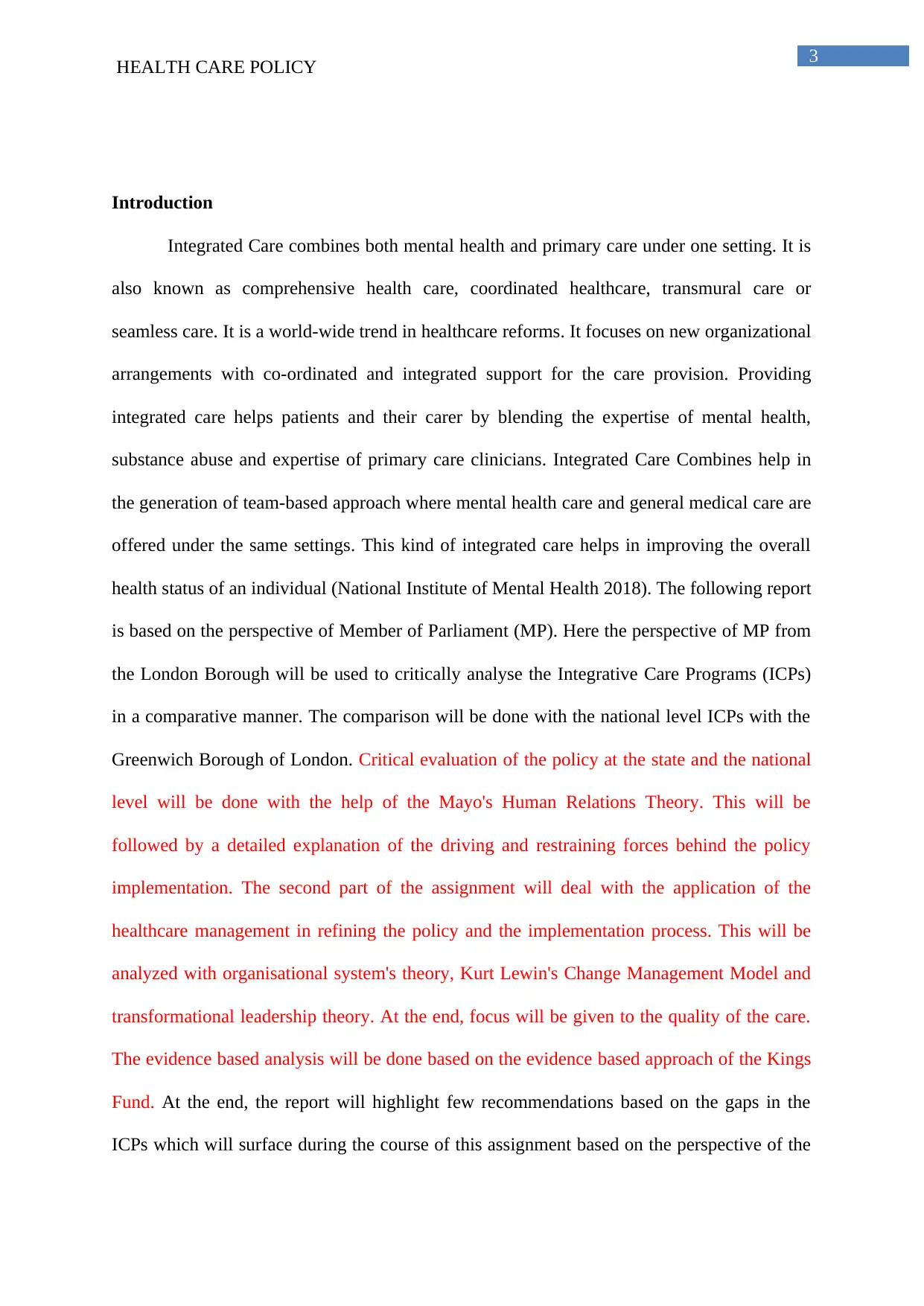
3
HEALTH CARE POLICY
Introduction
Integrated Care combines both mental health and primary care under one setting. It is
also known as comprehensive health care, coordinated healthcare, transmural care or
seamless care. It is a world-wide trend in healthcare reforms. It focuses on new organizational
arrangements with co-ordinated and integrated support for the care provision. Providing
integrated care helps patients and their carer by blending the expertise of mental health,
substance abuse and expertise of primary care clinicians. Integrated Care Combines help in
the generation of team-based approach where mental health care and general medical care are
offered under the same settings. This kind of integrated care helps in improving the overall
health status of an individual (National Institute of Mental Health 2018). The following report
is based on the perspective of Member of Parliament (MP). Here the perspective of MP from
the London Borough will be used to critically analyse the Integrative Care Programs (ICPs)
in a comparative manner. The comparison will be done with the national level ICPs with the
Greenwich Borough of London. Critical evaluation of the policy at the state and the national
level will be done with the help of the Mayo's Human Relations Theory. This will be
followed by a detailed explanation of the driving and restraining forces behind the policy
implementation. The second part of the assignment will deal with the application of the
healthcare management in refining the policy and the implementation process. This will be
analyzed with organisational system's theory, Kurt Lewin's Change Management Model and
transformational leadership theory. At the end, focus will be given to the quality of the care.
The evidence based analysis will be done based on the evidence based approach of the Kings
Fund. At the end, the report will highlight few recommendations based on the gaps in the
ICPs which will surface during the course of this assignment based on the perspective of the
HEALTH CARE POLICY
Introduction
Integrated Care combines both mental health and primary care under one setting. It is
also known as comprehensive health care, coordinated healthcare, transmural care or
seamless care. It is a world-wide trend in healthcare reforms. It focuses on new organizational
arrangements with co-ordinated and integrated support for the care provision. Providing
integrated care helps patients and their carer by blending the expertise of mental health,
substance abuse and expertise of primary care clinicians. Integrated Care Combines help in
the generation of team-based approach where mental health care and general medical care are
offered under the same settings. This kind of integrated care helps in improving the overall
health status of an individual (National Institute of Mental Health 2018). The following report
is based on the perspective of Member of Parliament (MP). Here the perspective of MP from
the London Borough will be used to critically analyse the Integrative Care Programs (ICPs)
in a comparative manner. The comparison will be done with the national level ICPs with the
Greenwich Borough of London. Critical evaluation of the policy at the state and the national
level will be done with the help of the Mayo's Human Relations Theory. This will be
followed by a detailed explanation of the driving and restraining forces behind the policy
implementation. The second part of the assignment will deal with the application of the
healthcare management in refining the policy and the implementation process. This will be
analyzed with organisational system's theory, Kurt Lewin's Change Management Model and
transformational leadership theory. At the end, focus will be given to the quality of the care.
The evidence based analysis will be done based on the evidence based approach of the Kings
Fund. At the end, the report will highlight few recommendations based on the gaps in the
ICPs which will surface during the course of this assignment based on the perspective of the
Paraphrase This Document
Need a fresh take? Get an instant paraphrase of this document with our AI Paraphraser
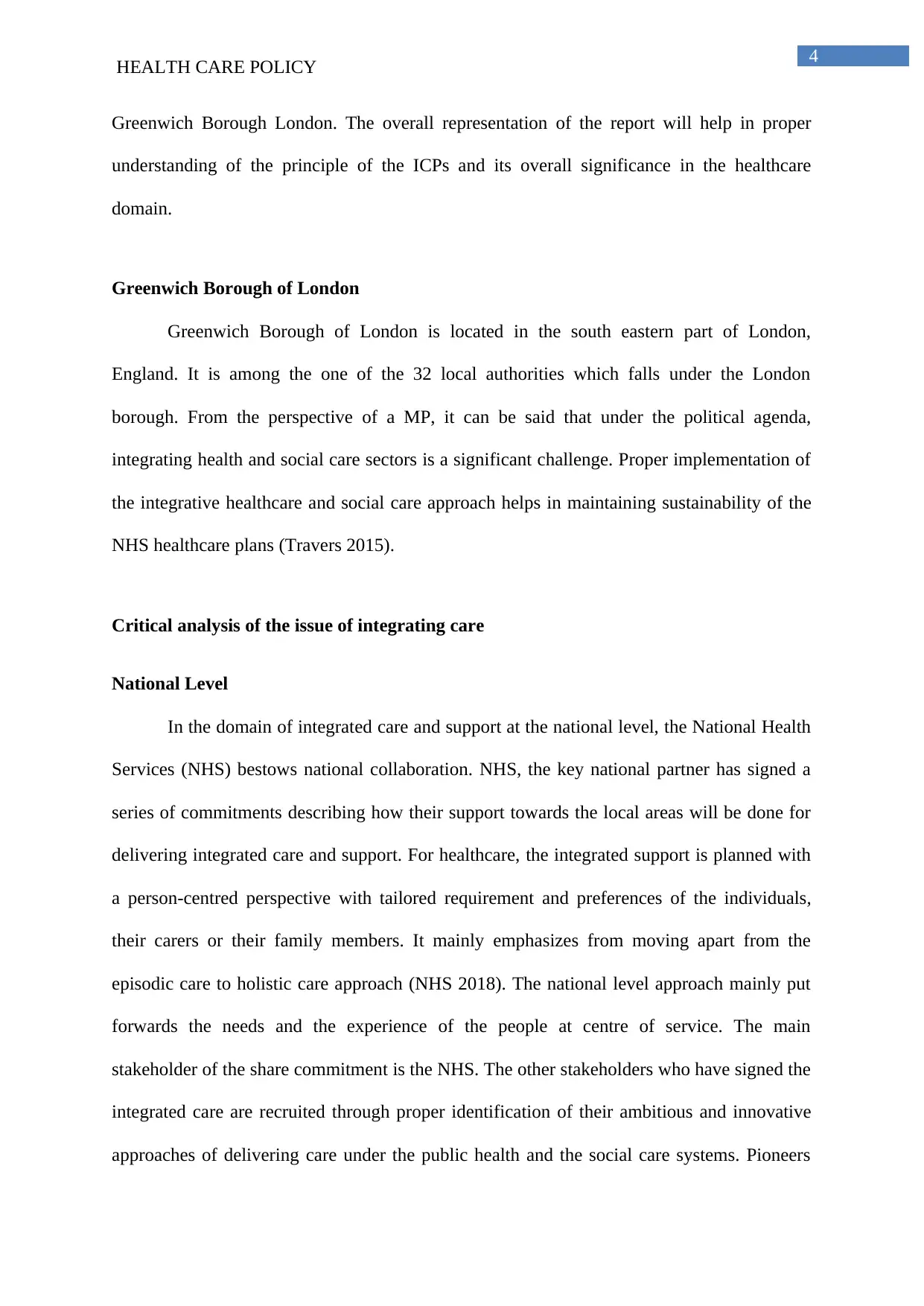
4
HEALTH CARE POLICY
Greenwich Borough London. The overall representation of the report will help in proper
understanding of the principle of the ICPs and its overall significance in the healthcare
domain.
Greenwich Borough of London
Greenwich Borough of London is located in the south eastern part of London,
England. It is among the one of the 32 local authorities which falls under the London
borough. From the perspective of a MP, it can be said that under the political agenda,
integrating health and social care sectors is a significant challenge. Proper implementation of
the integrative healthcare and social care approach helps in maintaining sustainability of the
NHS healthcare plans (Travers 2015).
Critical analysis of the issue of integrating care
National Level
In the domain of integrated care and support at the national level, the National Health
Services (NHS) bestows national collaboration. NHS, the key national partner has signed a
series of commitments describing how their support towards the local areas will be done for
delivering integrated care and support. For healthcare, the integrated support is planned with
a person-centred perspective with tailored requirement and preferences of the individuals,
their carers or their family members. It mainly emphasizes from moving apart from the
episodic care to holistic care approach (NHS 2018). The national level approach mainly put
forwards the needs and the experience of the people at centre of service. The main
stakeholder of the share commitment is the NHS. The other stakeholders who have signed the
integrated care are recruited through proper identification of their ambitious and innovative
approaches of delivering care under the public health and the social care systems. Pioneers
HEALTH CARE POLICY
Greenwich Borough London. The overall representation of the report will help in proper
understanding of the principle of the ICPs and its overall significance in the healthcare
domain.
Greenwich Borough of London
Greenwich Borough of London is located in the south eastern part of London,
England. It is among the one of the 32 local authorities which falls under the London
borough. From the perspective of a MP, it can be said that under the political agenda,
integrating health and social care sectors is a significant challenge. Proper implementation of
the integrative healthcare and social care approach helps in maintaining sustainability of the
NHS healthcare plans (Travers 2015).
Critical analysis of the issue of integrating care
National Level
In the domain of integrated care and support at the national level, the National Health
Services (NHS) bestows national collaboration. NHS, the key national partner has signed a
series of commitments describing how their support towards the local areas will be done for
delivering integrated care and support. For healthcare, the integrated support is planned with
a person-centred perspective with tailored requirement and preferences of the individuals,
their carers or their family members. It mainly emphasizes from moving apart from the
episodic care to holistic care approach (NHS 2018). The national level approach mainly put
forwards the needs and the experience of the people at centre of service. The main
stakeholder of the share commitment is the NHS. The other stakeholders who have signed the
integrated care are recruited through proper identification of their ambitious and innovative
approaches of delivering care under the public health and the social care systems. Pioneers
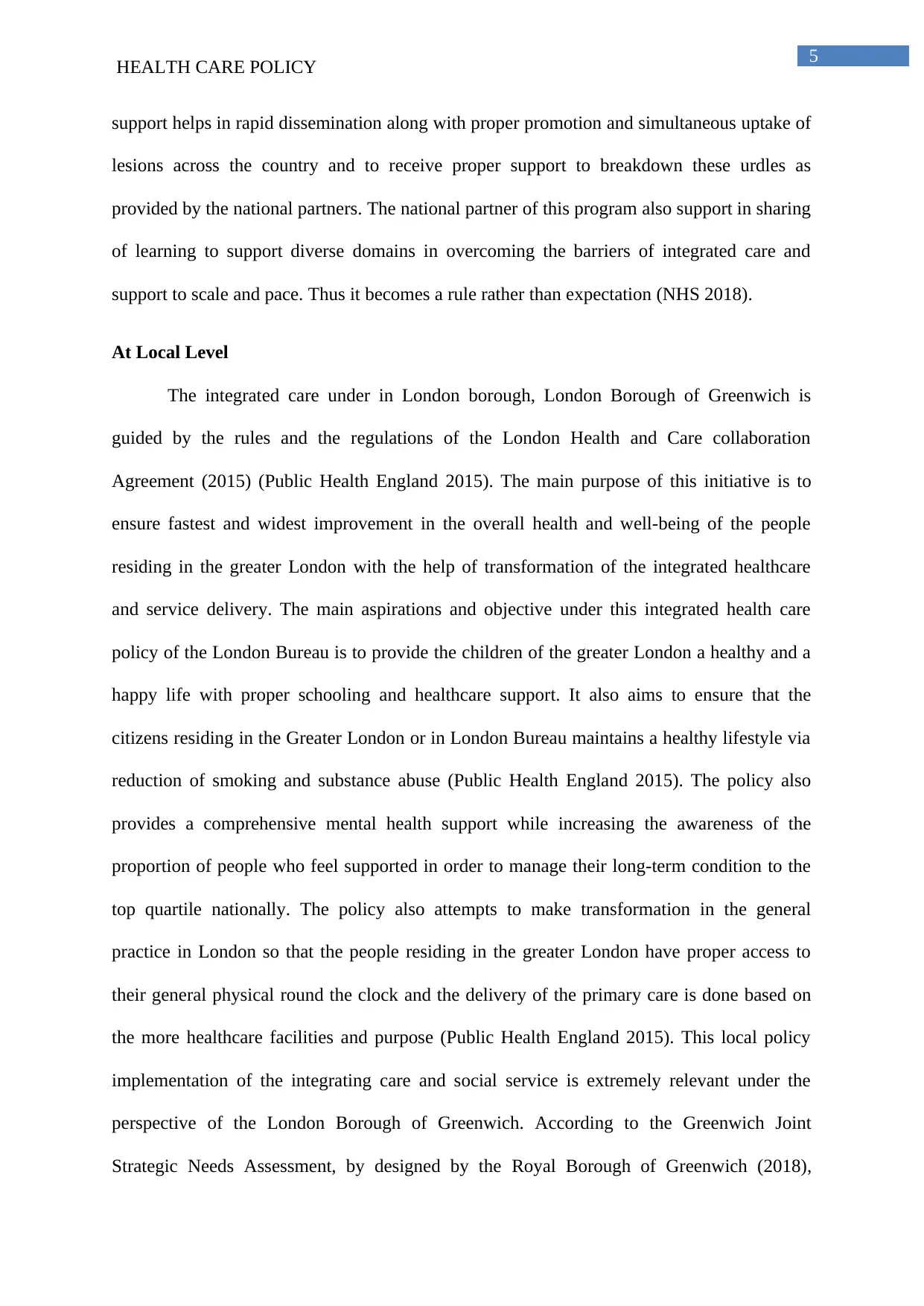
5
HEALTH CARE POLICY
support helps in rapid dissemination along with proper promotion and simultaneous uptake of
lesions across the country and to receive proper support to breakdown these urdles as
provided by the national partners. The national partner of this program also support in sharing
of learning to support diverse domains in overcoming the barriers of integrated care and
support to scale and pace. Thus it becomes a rule rather than expectation (NHS 2018).
At Local Level
The integrated care under in London borough, London Borough of Greenwich is
guided by the rules and the regulations of the London Health and Care collaboration
Agreement (2015) (Public Health England 2015). The main purpose of this initiative is to
ensure fastest and widest improvement in the overall health and well-being of the people
residing in the greater London with the help of transformation of the integrated healthcare
and service delivery. The main aspirations and objective under this integrated health care
policy of the London Bureau is to provide the children of the greater London a healthy and a
happy life with proper schooling and healthcare support. It also aims to ensure that the
citizens residing in the Greater London or in London Bureau maintains a healthy lifestyle via
reduction of smoking and substance abuse (Public Health England 2015). The policy also
provides a comprehensive mental health support while increasing the awareness of the
proportion of people who feel supported in order to manage their long-term condition to the
top quartile nationally. The policy also attempts to make transformation in the general
practice in London so that the people residing in the greater London have proper access to
their general physical round the clock and the delivery of the primary care is done based on
the more healthcare facilities and purpose (Public Health England 2015). This local policy
implementation of the integrating care and social service is extremely relevant under the
perspective of the London Borough of Greenwich. According to the Greenwich Joint
Strategic Needs Assessment, by designed by the Royal Borough of Greenwich (2018),
HEALTH CARE POLICY
support helps in rapid dissemination along with proper promotion and simultaneous uptake of
lesions across the country and to receive proper support to breakdown these urdles as
provided by the national partners. The national partner of this program also support in sharing
of learning to support diverse domains in overcoming the barriers of integrated care and
support to scale and pace. Thus it becomes a rule rather than expectation (NHS 2018).
At Local Level
The integrated care under in London borough, London Borough of Greenwich is
guided by the rules and the regulations of the London Health and Care collaboration
Agreement (2015) (Public Health England 2015). The main purpose of this initiative is to
ensure fastest and widest improvement in the overall health and well-being of the people
residing in the greater London with the help of transformation of the integrated healthcare
and service delivery. The main aspirations and objective under this integrated health care
policy of the London Bureau is to provide the children of the greater London a healthy and a
happy life with proper schooling and healthcare support. It also aims to ensure that the
citizens residing in the Greater London or in London Bureau maintains a healthy lifestyle via
reduction of smoking and substance abuse (Public Health England 2015). The policy also
provides a comprehensive mental health support while increasing the awareness of the
proportion of people who feel supported in order to manage their long-term condition to the
top quartile nationally. The policy also attempts to make transformation in the general
practice in London so that the people residing in the greater London have proper access to
their general physical round the clock and the delivery of the primary care is done based on
the more healthcare facilities and purpose (Public Health England 2015). This local policy
implementation of the integrating care and social service is extremely relevant under the
perspective of the London Borough of Greenwich. According to the Greenwich Joint
Strategic Needs Assessment, by designed by the Royal Borough of Greenwich (2018),
⊘ This is a preview!⊘
Do you want full access?
Subscribe today to unlock all pages.

Trusted by 1+ million students worldwide
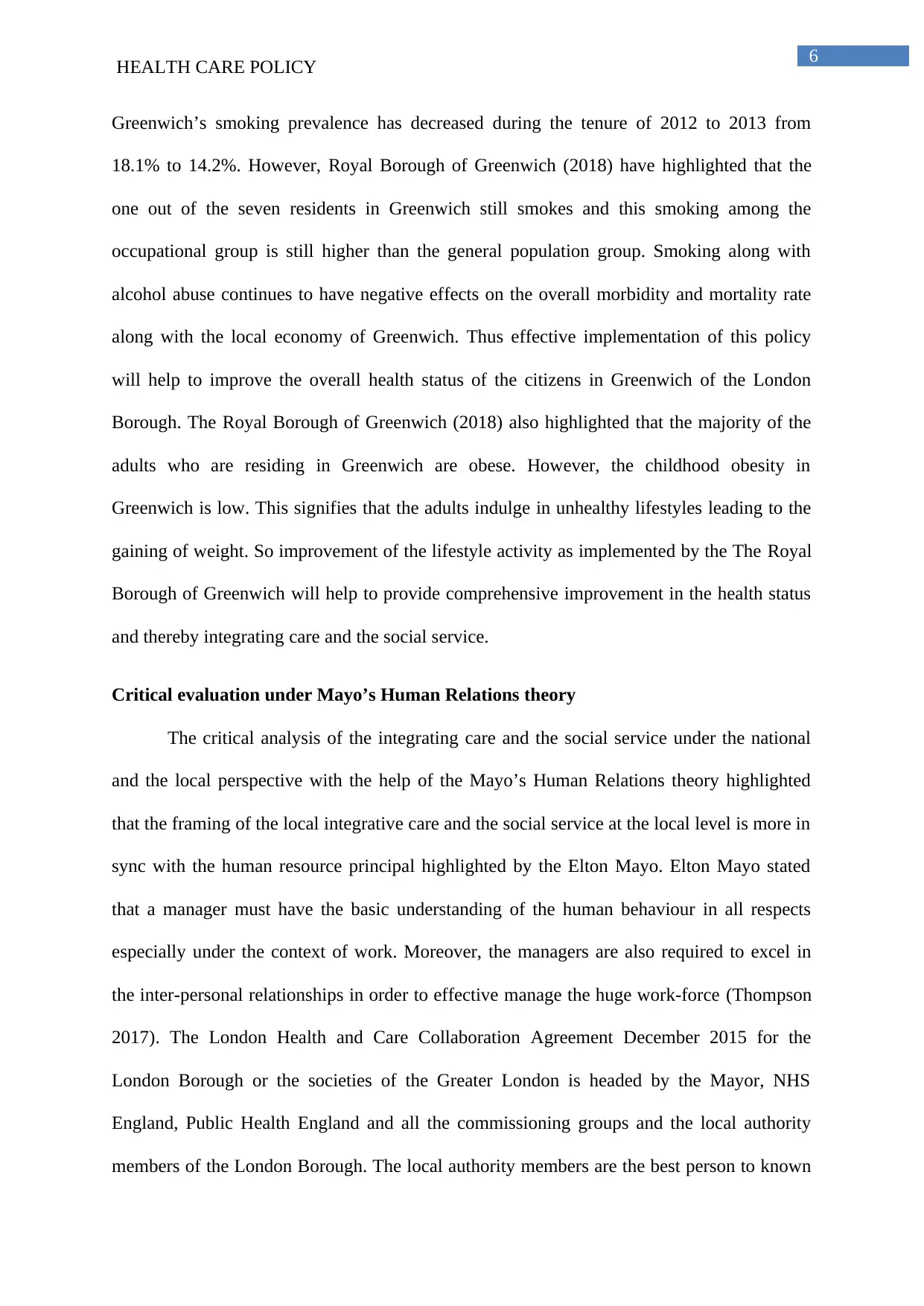
6
HEALTH CARE POLICY
Greenwich’s smoking prevalence has decreased during the tenure of 2012 to 2013 from
18.1% to 14.2%. However, Royal Borough of Greenwich (2018) have highlighted that the
one out of the seven residents in Greenwich still smokes and this smoking among the
occupational group is still higher than the general population group. Smoking along with
alcohol abuse continues to have negative effects on the overall morbidity and mortality rate
along with the local economy of Greenwich. Thus effective implementation of this policy
will help to improve the overall health status of the citizens in Greenwich of the London
Borough. The Royal Borough of Greenwich (2018) also highlighted that the majority of the
adults who are residing in Greenwich are obese. However, the childhood obesity in
Greenwich is low. This signifies that the adults indulge in unhealthy lifestyles leading to the
gaining of weight. So improvement of the lifestyle activity as implemented by the The Royal
Borough of Greenwich will help to provide comprehensive improvement in the health status
and thereby integrating care and the social service.
Critical evaluation under Mayo’s Human Relations theory
The critical analysis of the integrating care and the social service under the national
and the local perspective with the help of the Mayo’s Human Relations theory highlighted
that the framing of the local integrative care and the social service at the local level is more in
sync with the human resource principal highlighted by the Elton Mayo. Elton Mayo stated
that a manager must have the basic understanding of the human behaviour in all respects
especially under the context of work. Moreover, the managers are also required to excel in
the inter-personal relationships in order to effective manage the huge work-force (Thompson
2017). The London Health and Care Collaboration Agreement December 2015 for the
London Borough or the societies of the Greater London is headed by the Mayor, NHS
England, Public Health England and all the commissioning groups and the local authority
members of the London Borough. The local authority members are the best person to known
HEALTH CARE POLICY
Greenwich’s smoking prevalence has decreased during the tenure of 2012 to 2013 from
18.1% to 14.2%. However, Royal Borough of Greenwich (2018) have highlighted that the
one out of the seven residents in Greenwich still smokes and this smoking among the
occupational group is still higher than the general population group. Smoking along with
alcohol abuse continues to have negative effects on the overall morbidity and mortality rate
along with the local economy of Greenwich. Thus effective implementation of this policy
will help to improve the overall health status of the citizens in Greenwich of the London
Borough. The Royal Borough of Greenwich (2018) also highlighted that the majority of the
adults who are residing in Greenwich are obese. However, the childhood obesity in
Greenwich is low. This signifies that the adults indulge in unhealthy lifestyles leading to the
gaining of weight. So improvement of the lifestyle activity as implemented by the The Royal
Borough of Greenwich will help to provide comprehensive improvement in the health status
and thereby integrating care and the social service.
Critical evaluation under Mayo’s Human Relations theory
The critical analysis of the integrating care and the social service under the national
and the local perspective with the help of the Mayo’s Human Relations theory highlighted
that the framing of the local integrative care and the social service at the local level is more in
sync with the human resource principal highlighted by the Elton Mayo. Elton Mayo stated
that a manager must have the basic understanding of the human behaviour in all respects
especially under the context of work. Moreover, the managers are also required to excel in
the inter-personal relationships in order to effective manage the huge work-force (Thompson
2017). The London Health and Care Collaboration Agreement December 2015 for the
London Borough or the societies of the Greater London is headed by the Mayor, NHS
England, Public Health England and all the commissioning groups and the local authority
members of the London Borough. The local authority members are the best person to known
Paraphrase This Document
Need a fresh take? Get an instant paraphrase of this document with our AI Paraphraser
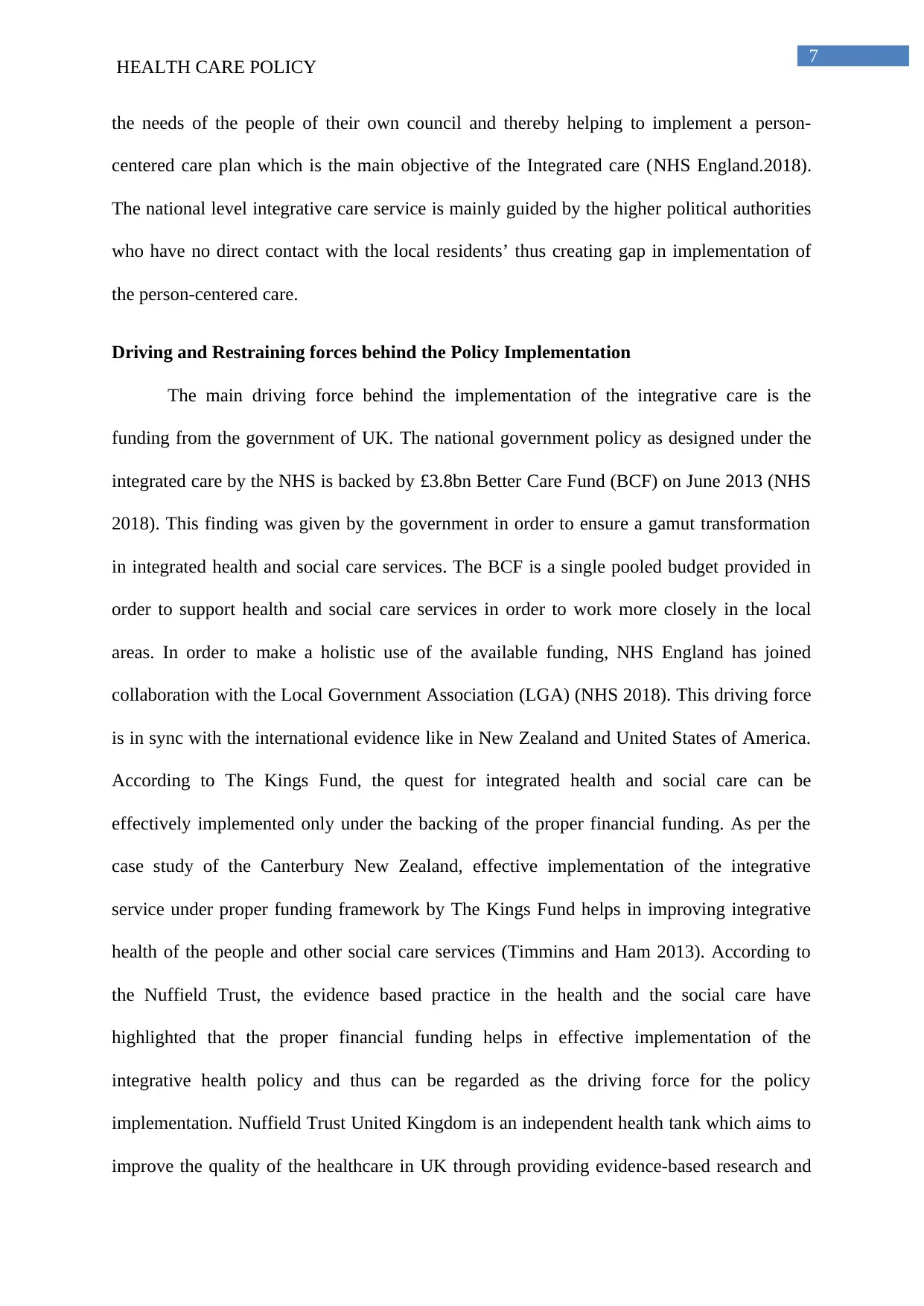
7
HEALTH CARE POLICY
the needs of the people of their own council and thereby helping to implement a person-
centered care plan which is the main objective of the Integrated care (NHS England.2018).
The national level integrative care service is mainly guided by the higher political authorities
who have no direct contact with the local residents’ thus creating gap in implementation of
the person-centered care.
Driving and Restraining forces behind the Policy Implementation
The main driving force behind the implementation of the integrative care is the
funding from the government of UK. The national government policy as designed under the
integrated care by the NHS is backed by £3.8bn Better Care Fund (BCF) on June 2013 (NHS
2018). This finding was given by the government in order to ensure a gamut transformation
in integrated health and social care services. The BCF is a single pooled budget provided in
order to support health and social care services in order to work more closely in the local
areas. In order to make a holistic use of the available funding, NHS England has joined
collaboration with the Local Government Association (LGA) (NHS 2018). This driving force
is in sync with the international evidence like in New Zealand and United States of America.
According to The Kings Fund, the quest for integrated health and social care can be
effectively implemented only under the backing of the proper financial funding. As per the
case study of the Canterbury New Zealand, effective implementation of the integrative
service under proper funding framework by The Kings Fund helps in improving integrative
health of the people and other social care services (Timmins and Ham 2013). According to
the Nuffield Trust, the evidence based practice in the health and the social care have
highlighted that the proper financial funding helps in effective implementation of the
integrative health policy and thus can be regarded as the driving force for the policy
implementation. Nuffield Trust United Kingdom is an independent health tank which aims to
improve the quality of the healthcare in UK through providing evidence-based research and
HEALTH CARE POLICY
the needs of the people of their own council and thereby helping to implement a person-
centered care plan which is the main objective of the Integrated care (NHS England.2018).
The national level integrative care service is mainly guided by the higher political authorities
who have no direct contact with the local residents’ thus creating gap in implementation of
the person-centered care.
Driving and Restraining forces behind the Policy Implementation
The main driving force behind the implementation of the integrative care is the
funding from the government of UK. The national government policy as designed under the
integrated care by the NHS is backed by £3.8bn Better Care Fund (BCF) on June 2013 (NHS
2018). This finding was given by the government in order to ensure a gamut transformation
in integrated health and social care services. The BCF is a single pooled budget provided in
order to support health and social care services in order to work more closely in the local
areas. In order to make a holistic use of the available funding, NHS England has joined
collaboration with the Local Government Association (LGA) (NHS 2018). This driving force
is in sync with the international evidence like in New Zealand and United States of America.
According to The Kings Fund, the quest for integrated health and social care can be
effectively implemented only under the backing of the proper financial funding. As per the
case study of the Canterbury New Zealand, effective implementation of the integrative
service under proper funding framework by The Kings Fund helps in improving integrative
health of the people and other social care services (Timmins and Ham 2013). According to
the Nuffield Trust, the evidence based practice in the health and the social care have
highlighted that the proper financial funding helps in effective implementation of the
integrative health policy and thus can be regarded as the driving force for the policy
implementation. Nuffield Trust United Kingdom is an independent health tank which aims to
improve the quality of the healthcare in UK through providing evidence-based research and
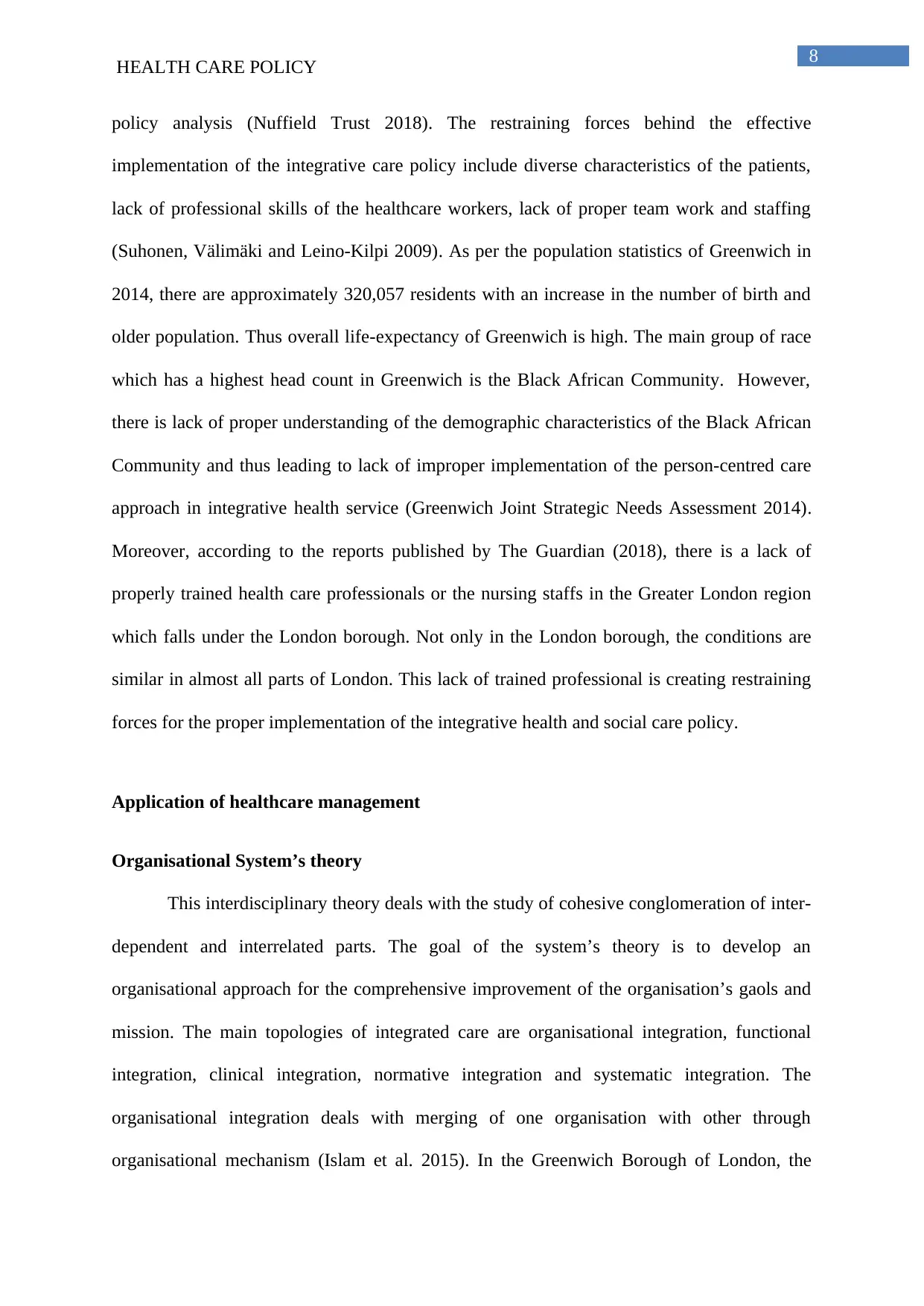
8
HEALTH CARE POLICY
policy analysis (Nuffield Trust 2018). The restraining forces behind the effective
implementation of the integrative care policy include diverse characteristics of the patients,
lack of professional skills of the healthcare workers, lack of proper team work and staffing
(Suhonen, Välimäki and Leino-Kilpi 2009). As per the population statistics of Greenwich in
2014, there are approximately 320,057 residents with an increase in the number of birth and
older population. Thus overall life-expectancy of Greenwich is high. The main group of race
which has a highest head count in Greenwich is the Black African Community. However,
there is lack of proper understanding of the demographic characteristics of the Black African
Community and thus leading to lack of improper implementation of the person-centred care
approach in integrative health service (Greenwich Joint Strategic Needs Assessment 2014).
Moreover, according to the reports published by The Guardian (2018), there is a lack of
properly trained health care professionals or the nursing staffs in the Greater London region
which falls under the London borough. Not only in the London borough, the conditions are
similar in almost all parts of London. This lack of trained professional is creating restraining
forces for the proper implementation of the integrative health and social care policy.
Application of healthcare management
Organisational System’s theory
This interdisciplinary theory deals with the study of cohesive conglomeration of inter-
dependent and interrelated parts. The goal of the system’s theory is to develop an
organisational approach for the comprehensive improvement of the organisation’s gaols and
mission. The main topologies of integrated care are organisational integration, functional
integration, clinical integration, normative integration and systematic integration. The
organisational integration deals with merging of one organisation with other through
organisational mechanism (Islam et al. 2015). In the Greenwich Borough of London, the
HEALTH CARE POLICY
policy analysis (Nuffield Trust 2018). The restraining forces behind the effective
implementation of the integrative care policy include diverse characteristics of the patients,
lack of professional skills of the healthcare workers, lack of proper team work and staffing
(Suhonen, Välimäki and Leino-Kilpi 2009). As per the population statistics of Greenwich in
2014, there are approximately 320,057 residents with an increase in the number of birth and
older population. Thus overall life-expectancy of Greenwich is high. The main group of race
which has a highest head count in Greenwich is the Black African Community. However,
there is lack of proper understanding of the demographic characteristics of the Black African
Community and thus leading to lack of improper implementation of the person-centred care
approach in integrative health service (Greenwich Joint Strategic Needs Assessment 2014).
Moreover, according to the reports published by The Guardian (2018), there is a lack of
properly trained health care professionals or the nursing staffs in the Greater London region
which falls under the London borough. Not only in the London borough, the conditions are
similar in almost all parts of London. This lack of trained professional is creating restraining
forces for the proper implementation of the integrative health and social care policy.
Application of healthcare management
Organisational System’s theory
This interdisciplinary theory deals with the study of cohesive conglomeration of inter-
dependent and interrelated parts. The goal of the system’s theory is to develop an
organisational approach for the comprehensive improvement of the organisation’s gaols and
mission. The main topologies of integrated care are organisational integration, functional
integration, clinical integration, normative integration and systematic integration. The
organisational integration deals with merging of one organisation with other through
organisational mechanism (Islam et al. 2015). In the Greenwich Borough of London, the
⊘ This is a preview!⊘
Do you want full access?
Subscribe today to unlock all pages.

Trusted by 1+ million students worldwide
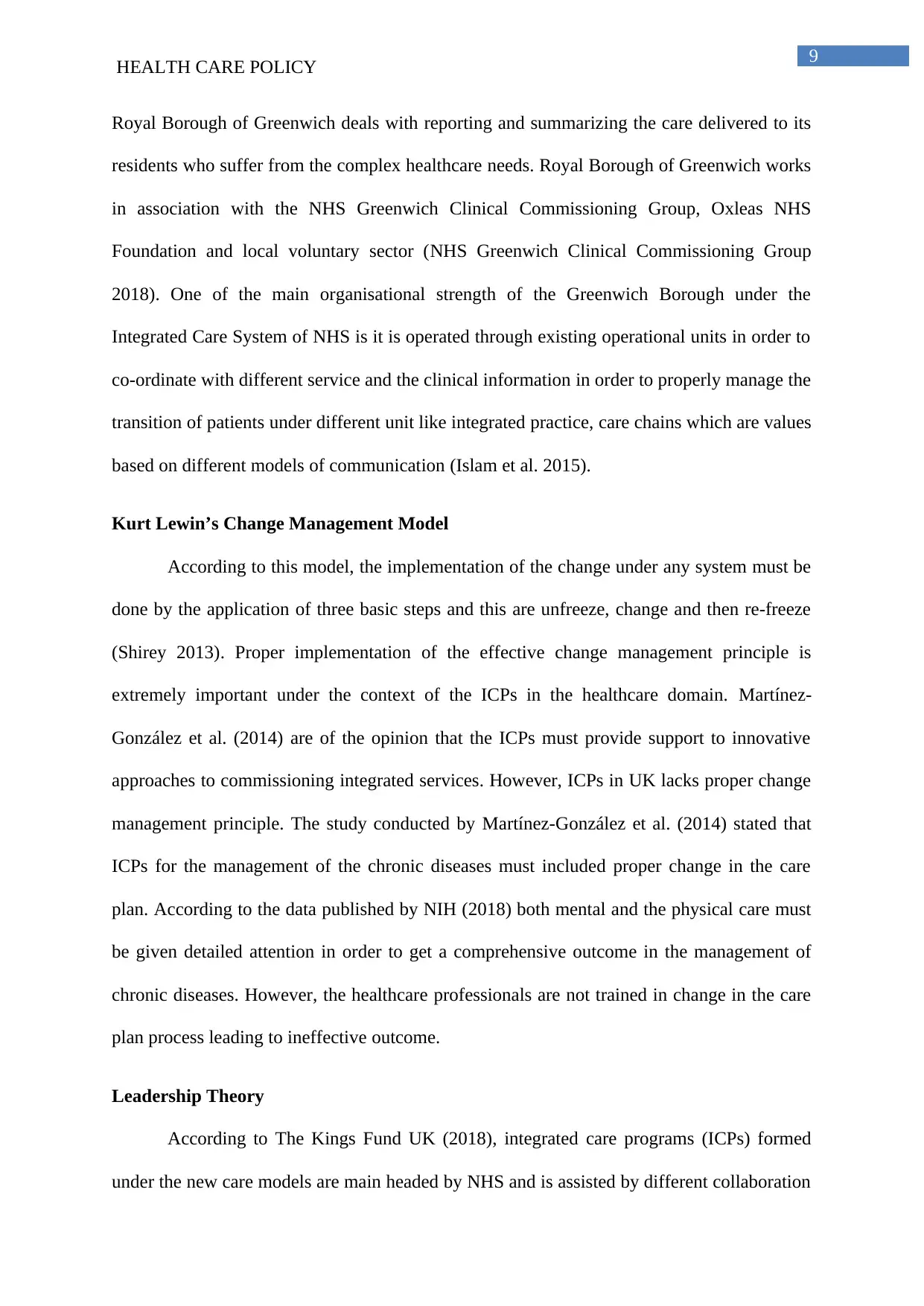
9
HEALTH CARE POLICY
Royal Borough of Greenwich deals with reporting and summarizing the care delivered to its
residents who suffer from the complex healthcare needs. Royal Borough of Greenwich works
in association with the NHS Greenwich Clinical Commissioning Group, Oxleas NHS
Foundation and local voluntary sector (NHS Greenwich Clinical Commissioning Group
2018). One of the main organisational strength of the Greenwich Borough under the
Integrated Care System of NHS is it is operated through existing operational units in order to
co-ordinate with different service and the clinical information in order to properly manage the
transition of patients under different unit like integrated practice, care chains which are values
based on different models of communication (Islam et al. 2015).
Kurt Lewin’s Change Management Model
According to this model, the implementation of the change under any system must be
done by the application of three basic steps and this are unfreeze, change and then re-freeze
(Shirey 2013). Proper implementation of the effective change management principle is
extremely important under the context of the ICPs in the healthcare domain. Martínez-
González et al. (2014) are of the opinion that the ICPs must provide support to innovative
approaches to commissioning integrated services. However, ICPs in UK lacks proper change
management principle. The study conducted by Martínez-González et al. (2014) stated that
ICPs for the management of the chronic diseases must included proper change in the care
plan. According to the data published by NIH (2018) both mental and the physical care must
be given detailed attention in order to get a comprehensive outcome in the management of
chronic diseases. However, the healthcare professionals are not trained in change in the care
plan process leading to ineffective outcome.
Leadership Theory
According to The Kings Fund UK (2018), integrated care programs (ICPs) formed
under the new care models are main headed by NHS and is assisted by different collaboration
HEALTH CARE POLICY
Royal Borough of Greenwich deals with reporting and summarizing the care delivered to its
residents who suffer from the complex healthcare needs. Royal Borough of Greenwich works
in association with the NHS Greenwich Clinical Commissioning Group, Oxleas NHS
Foundation and local voluntary sector (NHS Greenwich Clinical Commissioning Group
2018). One of the main organisational strength of the Greenwich Borough under the
Integrated Care System of NHS is it is operated through existing operational units in order to
co-ordinate with different service and the clinical information in order to properly manage the
transition of patients under different unit like integrated practice, care chains which are values
based on different models of communication (Islam et al. 2015).
Kurt Lewin’s Change Management Model
According to this model, the implementation of the change under any system must be
done by the application of three basic steps and this are unfreeze, change and then re-freeze
(Shirey 2013). Proper implementation of the effective change management principle is
extremely important under the context of the ICPs in the healthcare domain. Martínez-
González et al. (2014) are of the opinion that the ICPs must provide support to innovative
approaches to commissioning integrated services. However, ICPs in UK lacks proper change
management principle. The study conducted by Martínez-González et al. (2014) stated that
ICPs for the management of the chronic diseases must included proper change in the care
plan. According to the data published by NIH (2018) both mental and the physical care must
be given detailed attention in order to get a comprehensive outcome in the management of
chronic diseases. However, the healthcare professionals are not trained in change in the care
plan process leading to ineffective outcome.
Leadership Theory
According to The Kings Fund UK (2018), integrated care programs (ICPs) formed
under the new care models are main headed by NHS and is assisted by different collaboration
Paraphrase This Document
Need a fresh take? Get an instant paraphrase of this document with our AI Paraphraser
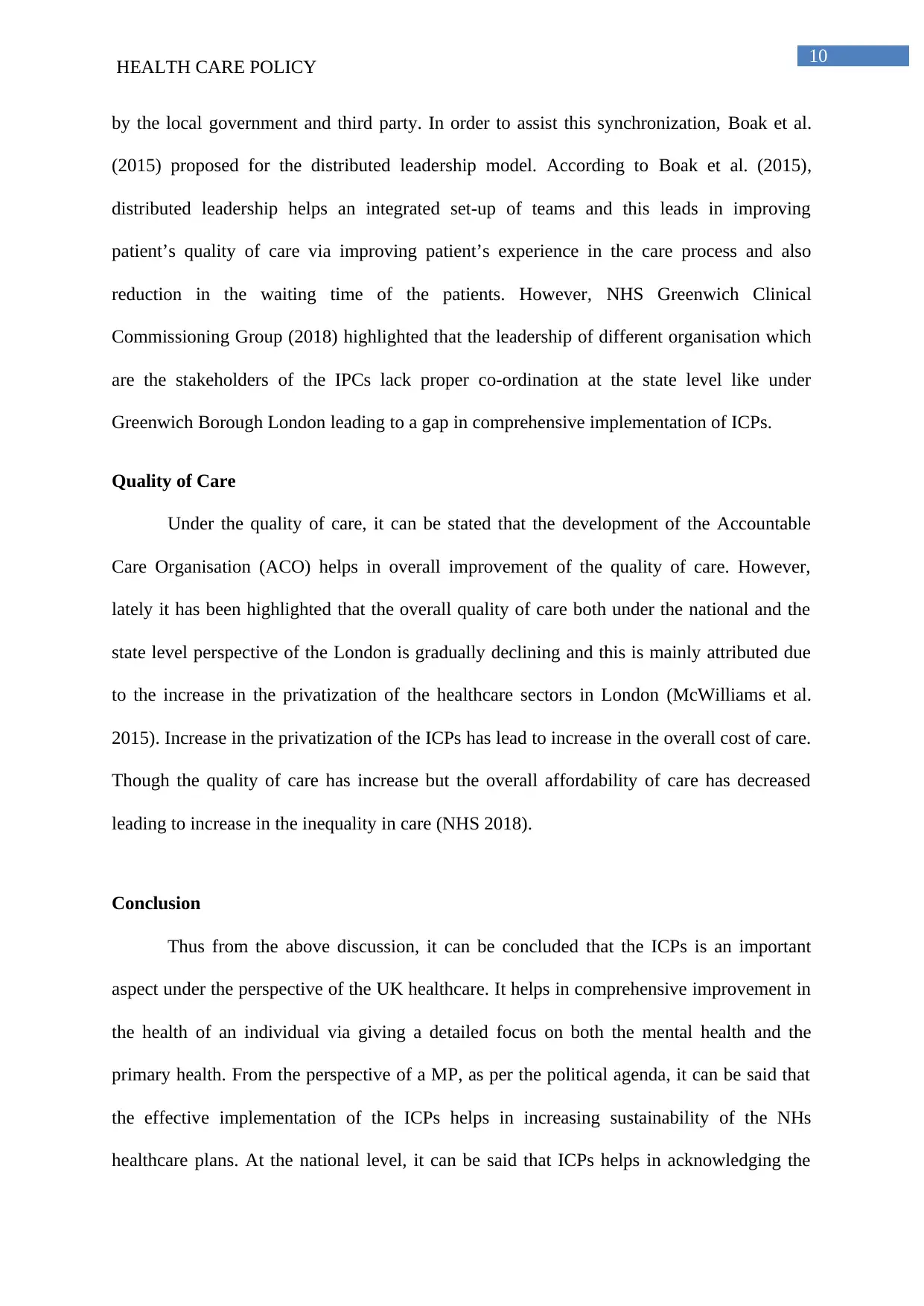
10
HEALTH CARE POLICY
by the local government and third party. In order to assist this synchronization, Boak et al.
(2015) proposed for the distributed leadership model. According to Boak et al. (2015),
distributed leadership helps an integrated set-up of teams and this leads in improving
patient’s quality of care via improving patient’s experience in the care process and also
reduction in the waiting time of the patients. However, NHS Greenwich Clinical
Commissioning Group (2018) highlighted that the leadership of different organisation which
are the stakeholders of the IPCs lack proper co-ordination at the state level like under
Greenwich Borough London leading to a gap in comprehensive implementation of ICPs.
Quality of Care
Under the quality of care, it can be stated that the development of the Accountable
Care Organisation (ACO) helps in overall improvement of the quality of care. However,
lately it has been highlighted that the overall quality of care both under the national and the
state level perspective of the London is gradually declining and this is mainly attributed due
to the increase in the privatization of the healthcare sectors in London (McWilliams et al.
2015). Increase in the privatization of the ICPs has lead to increase in the overall cost of care.
Though the quality of care has increase but the overall affordability of care has decreased
leading to increase in the inequality in care (NHS 2018).
Conclusion
Thus from the above discussion, it can be concluded that the ICPs is an important
aspect under the perspective of the UK healthcare. It helps in comprehensive improvement in
the health of an individual via giving a detailed focus on both the mental health and the
primary health. From the perspective of a MP, as per the political agenda, it can be said that
the effective implementation of the ICPs helps in increasing sustainability of the NHs
healthcare plans. At the national level, it can be said that ICPs helps in acknowledging the
HEALTH CARE POLICY
by the local government and third party. In order to assist this synchronization, Boak et al.
(2015) proposed for the distributed leadership model. According to Boak et al. (2015),
distributed leadership helps an integrated set-up of teams and this leads in improving
patient’s quality of care via improving patient’s experience in the care process and also
reduction in the waiting time of the patients. However, NHS Greenwich Clinical
Commissioning Group (2018) highlighted that the leadership of different organisation which
are the stakeholders of the IPCs lack proper co-ordination at the state level like under
Greenwich Borough London leading to a gap in comprehensive implementation of ICPs.
Quality of Care
Under the quality of care, it can be stated that the development of the Accountable
Care Organisation (ACO) helps in overall improvement of the quality of care. However,
lately it has been highlighted that the overall quality of care both under the national and the
state level perspective of the London is gradually declining and this is mainly attributed due
to the increase in the privatization of the healthcare sectors in London (McWilliams et al.
2015). Increase in the privatization of the ICPs has lead to increase in the overall cost of care.
Though the quality of care has increase but the overall affordability of care has decreased
leading to increase in the inequality in care (NHS 2018).
Conclusion
Thus from the above discussion, it can be concluded that the ICPs is an important
aspect under the perspective of the UK healthcare. It helps in comprehensive improvement in
the health of an individual via giving a detailed focus on both the mental health and the
primary health. From the perspective of a MP, as per the political agenda, it can be said that
the effective implementation of the ICPs helps in increasing sustainability of the NHs
healthcare plans. At the national level, it can be said that ICPs helps in acknowledging the
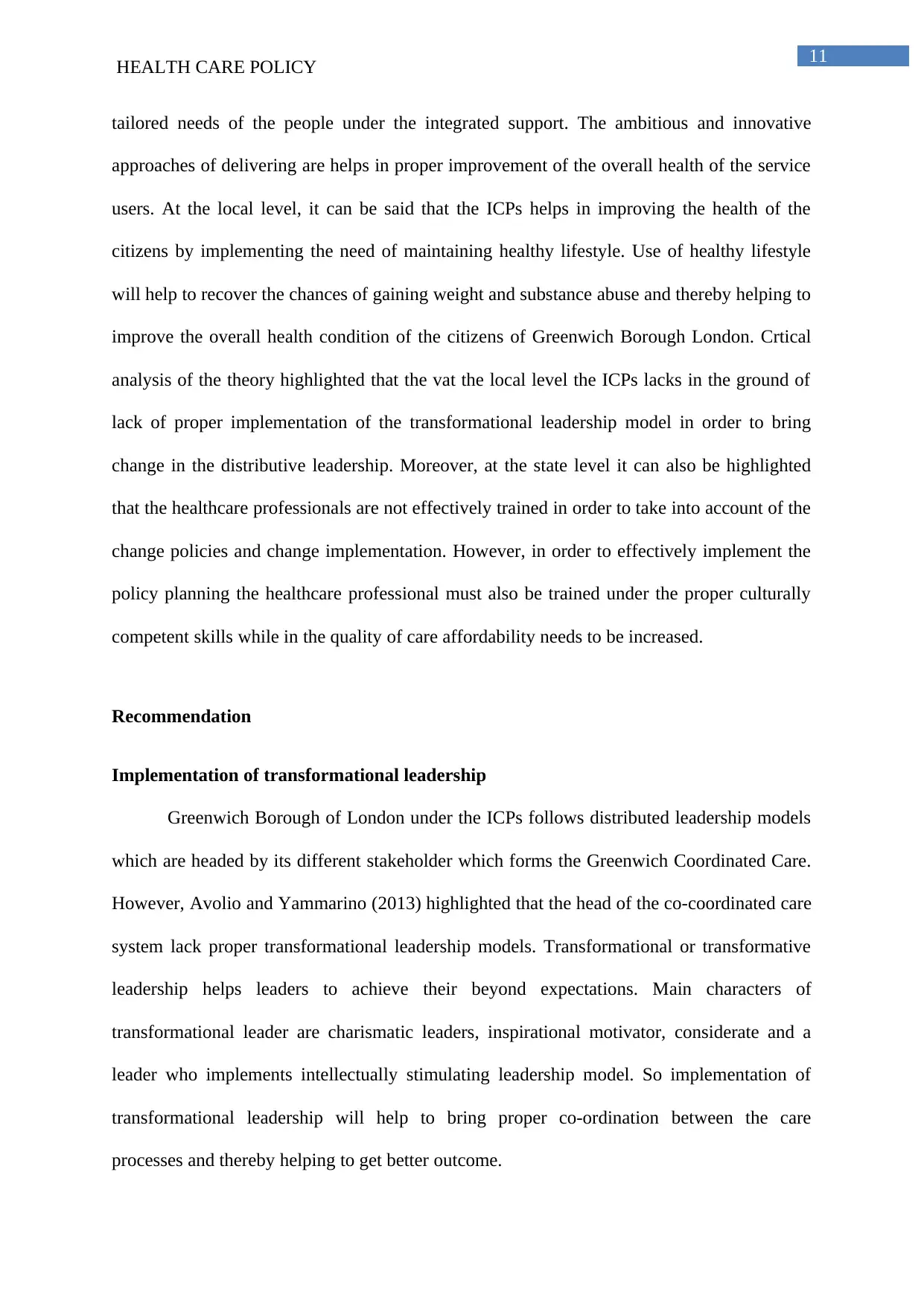
11
HEALTH CARE POLICY
tailored needs of the people under the integrated support. The ambitious and innovative
approaches of delivering are helps in proper improvement of the overall health of the service
users. At the local level, it can be said that the ICPs helps in improving the health of the
citizens by implementing the need of maintaining healthy lifestyle. Use of healthy lifestyle
will help to recover the chances of gaining weight and substance abuse and thereby helping to
improve the overall health condition of the citizens of Greenwich Borough London. Crtical
analysis of the theory highlighted that the vat the local level the ICPs lacks in the ground of
lack of proper implementation of the transformational leadership model in order to bring
change in the distributive leadership. Moreover, at the state level it can also be highlighted
that the healthcare professionals are not effectively trained in order to take into account of the
change policies and change implementation. However, in order to effectively implement the
policy planning the healthcare professional must also be trained under the proper culturally
competent skills while in the quality of care affordability needs to be increased.
Recommendation
Implementation of transformational leadership
Greenwich Borough of London under the ICPs follows distributed leadership models
which are headed by its different stakeholder which forms the Greenwich Coordinated Care.
However, Avolio and Yammarino (2013) highlighted that the head of the co-coordinated care
system lack proper transformational leadership models. Transformational or transformative
leadership helps leaders to achieve their beyond expectations. Main characters of
transformational leader are charismatic leaders, inspirational motivator, considerate and a
leader who implements intellectually stimulating leadership model. So implementation of
transformational leadership will help to bring proper co-ordination between the care
processes and thereby helping to get better outcome.
HEALTH CARE POLICY
tailored needs of the people under the integrated support. The ambitious and innovative
approaches of delivering are helps in proper improvement of the overall health of the service
users. At the local level, it can be said that the ICPs helps in improving the health of the
citizens by implementing the need of maintaining healthy lifestyle. Use of healthy lifestyle
will help to recover the chances of gaining weight and substance abuse and thereby helping to
improve the overall health condition of the citizens of Greenwich Borough London. Crtical
analysis of the theory highlighted that the vat the local level the ICPs lacks in the ground of
lack of proper implementation of the transformational leadership model in order to bring
change in the distributive leadership. Moreover, at the state level it can also be highlighted
that the healthcare professionals are not effectively trained in order to take into account of the
change policies and change implementation. However, in order to effectively implement the
policy planning the healthcare professional must also be trained under the proper culturally
competent skills while in the quality of care affordability needs to be increased.
Recommendation
Implementation of transformational leadership
Greenwich Borough of London under the ICPs follows distributed leadership models
which are headed by its different stakeholder which forms the Greenwich Coordinated Care.
However, Avolio and Yammarino (2013) highlighted that the head of the co-coordinated care
system lack proper transformational leadership models. Transformational or transformative
leadership helps leaders to achieve their beyond expectations. Main characters of
transformational leader are charismatic leaders, inspirational motivator, considerate and a
leader who implements intellectually stimulating leadership model. So implementation of
transformational leadership will help to bring proper co-ordination between the care
processes and thereby helping to get better outcome.
⊘ This is a preview!⊘
Do you want full access?
Subscribe today to unlock all pages.

Trusted by 1+ million students worldwide
1 out of 16
Related Documents
Your All-in-One AI-Powered Toolkit for Academic Success.
+13062052269
info@desklib.com
Available 24*7 on WhatsApp / Email
![[object Object]](/_next/static/media/star-bottom.7253800d.svg)
Unlock your academic potential
Copyright © 2020–2026 A2Z Services. All Rights Reserved. Developed and managed by ZUCOL.




